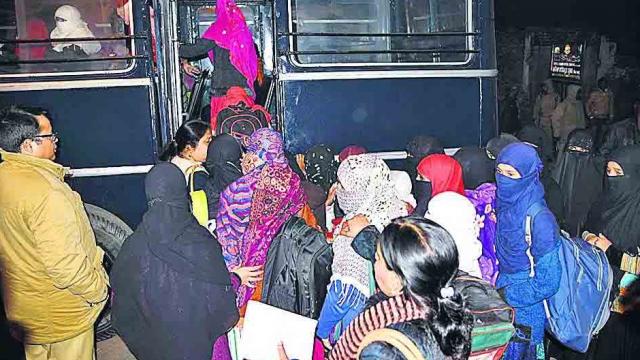The town of Shahadatganj in Lucknow woke up to a horrific turn of events on New Year’s Eve. The Lucknow Police arrested Taiyab Jiya, manager of an all-girls madrasa in Shahadatganj after conducting a raid following receiving written complaints from girls against the madrasa manager.
About 125 girls were enrolled at the madrasa in question and almost all of them had to undergo various atrocities. The girls were held hostage, made to dance to vulgar songs, brutally beaten and sexually exploited. At the time of the raid, 51 girls were found to be held hostage in the madrasa who were subsequently rescued. The matter came to light after the victims threw pieces of paper mentioning their ordeal at neighbours’ houses, who then took the matter to law enforcement agencies.
While the police are investigating whether the madrasa was registered or not, an important step taken by the Yogi Adityanath Government in October is back in the spotlight. Since assuming power, the U.P government is determined to crack the whip on illegal madrasas. The U.P government notified over 19,000 madrasas present in the state to upload relevant details like the managing committee of the madrasas, teachers, students and other information on the madrasa portal. Despite repeated reminders and extension of the deadline, around 2682 madrasas failed to provide the details and their accreditation was subsequently cancelled by the government. While this order received a lot of flak back then, it’s importance can now be realized after last week’s events.
Madrasas have a long history of getting embroiled in controversies. On one hand, we have girls being sexually assaulted while on the other hand, the madrasas act as a safe haven for the terrorists. Look at the case of West Bengal especially the rural areas who are fast turning into a safe haven for the terrorists. The National Investigating Agency (NIA) has unearthed a chain of illegal madrasas or Muslim educational centers, which were being used as a cover for providing training to militants with the primary objective being to recruit the Muslim youth by misguiding them using religious books and subsequently train them in explosive manufacturing. What makes matter worse is the fact that the state shares a border with Bangladesh which makes it privy to terrorist outfits like the Jamaat-ul Mujahideen, a banned Bangladeshi outfit.
Perhaps the local administration is equally to be blamed. While on one side we have Yogi Adityanath who is determined to root out radical outfits from U.P while on the other side Mamata Banerjee in a bid to appease the minorities doesn’t blink an eye towards religious extremism fearing it will harm her core voter base. In a damning indictment of her government, the NIA found that the illegal madrasas mushroomed since the Trinamool Congress came to power in Bengal as the local administration didn’t feel the need to monitor the illegal madrasas. The terror groups cozied up to the Trinamool administration which in turn led the local police to give them a free hand and hence continued with their sinister operations virtually unchecked and didn’t face any queries from the law enforcement agencies. The Burdwan bomb blast that took place on October 2, 2014, occurred in a rented two-storey building owned by Nurul Hasan Chowdhary, a Trinamool Congress leader operating on the pretext of being a madrasa.
The recent events bring the state of madrasas back into the limelight. There is an urgent need to regulate the madrasas, but the so-called secular leaders will never act against these illegal madrasas fearing that they might anger the minority community, their biggest vote bank.
The madrasas are the only mode of education for many Muslim families who cannot afford primary education for their children. There is an urgent need for the government to provide quality and affordable primary education to deter parents from sending their wards to such madrasas. The families who send their children to madrasas with the hope that their child in future would lift them out of poverty, however, have to face their child either being sexually assaulted or being radicalized for Jihad.
It’s not that every madrasa is a terror haven or a place for sexual assaulters but there is an urgent need to regulate them. The United Kingdom shows the way how. The UK in 2015 announced a code of conduct to regulate the madrasas in a bid to protect the children enrolled there after a slew of accusations against the madrasas forced the British government to act. All teachers at the madrasas would be vetted by the police and the syllabus will be approved and regularly checked upon by the government to prevent the spreading of any extremist ideology. The UK has approximately 2,000 madrasas present in the whole country whereas, in India, Uttar Pradesh alone has over 19,000 madrasas. In such a case, regulation becomes paramount but it’s hard to see the harbingers of secularism agreeing to regulate the madrasas given the fact that they oppose the bill banning triple talaq to appease a certain section of the community.
